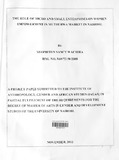| dc.description.abstract | Women entrepreneurship in particular is attracting the attention of policy makers and researchers because it has been recognized during the last decade as an important and untapped source of economic growth. However, we still lack a reliable and detailed picture of the economic impact on women's entrepreneurship. Entrepreneurship development among women is one activity that promises encouraging results. By motivating, training and assisting women towards independent business ventures, it may be possible to bring beneficial results in the development of a region. Women's entrepreneurial activities are not only a means for economic survival but also, to empower them economically and enable them to contribute more to overall development. The main objective of the study was to establish the impact of women's entrepreneurial activities in Muthurwa Market. The specific objectives of the study were to explore the benefits of women's entrepreneurial activities and to determine the challenges that women faced as entrepreneurs.
The study employed both qualitative and quantitative methods of data collection, which included key informants interviews and a structured questionnaire. The study randomly sampled 75 women entrepreneurs, while 10 key informants were purposively selected from government officers in local authority, women organizations within the market, financial institutions that lend money to the women entrepreneurs and City Council business licensing officers. From the study, it was evident that women entrepreneurs had benefited from their businesses and were able to meet the family food expenditure, meet the children's school fees, pay house rent, increase stock and client base. The study findings show that women entrepreneurs start their businesses with minimal start-up capital obtained through loans from merry-go-round groups and family savings. The study also shows that women entrepreneurs traded in electronics, new clothes and second hand clothes. Further, the study shows that women entrepreneurs use their income to pay school fees for their children, feed the family and whatever is left is used to expand the business.
The study findings show that more than three quarters of the women entrepreneurs had secondary and post secondary school level education while slightly over half of them had some form of training after school. Only a minority had primary level education level. The study shows that women entrepreneurs faced a number of challenges such as balancing business time and family work, access to financial credit, balancing family expqnditure and business growth, the process of acquiring a license, their double roles as well as low education levels. The study recommends that the process of registering and acquiring a business license be defined and simplified so that a lot of time and resources are not wasted while trying to register a business and to also make it affordable and friendly to the women entrepreneurs.
The study recommends that there is need to have appropriate data on the informal economy. Thus, there is need to have sufficient and detailed statistics on the small and micro enterprises especially those operated by women so as to inform decision making policy formulation and planning. The study further recommends training of women entrepreneurs on aspects of sound business management, customer care, Information Communication Technology (lCT) and business diversification to help them improve on their business management skills and overcome the challenges of balancing business time and resources with family time and resources.
The study recommends that the process of getting a loan from the Women Enterprise Fund be redefined and shortened, so that it can be friendly to those with limited education levels and women entrepreneurs can access loans from the Fund. | en_US |

